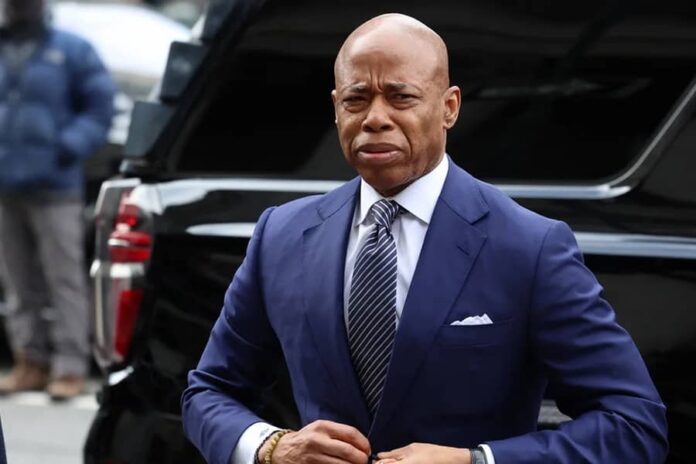Wednesday’s much anticipated hearing on the Justice Department’s motion to dismiss the case against New York City Mayor Eric Adams has ended without an immediate ruling from Judge Dale Ho.
Ho said he was not going to “shoot from the hip” on the bench, just before adjourning the hearing.
The DOJ move to end the case against Adams prompted an exodus of prosecutors who disagreed with the decision. Eight federal prosecutors, including the interim US attorney for the Southern District of New York, have resigned in protest. Four deputy mayors have departed City Hall as well.
Acting Deputy Attorney General Emil Bove, who sat alone at the prosecution table, argued the case should be dismissed without prejudice, meaning it could be revived, because of “appearances of impropriety and risks of interference with the 2025 elections in New York City” and because continuing the case would “interfere with the defendant’s ability to govern in New York City” and threaten President Donald Trump’s immigration policies.
“Frankly, I think the fact that Mayor Adams is sitting to my left right now is part of the problem. He’s not able to be out running the city and campaigning, so I think that this motion is actual interference,” Bove said in court on Wednesday.
In court, Adams’ attorney Alex Spiro said suggestions of any quid quo pro between Adams and the Trump administration are false and said “it never happened.”
Judge Ho asked Adams a series of routine questions about his mental state and understanding of the situation before finding him competent to voluntary consent to the motion to dismiss the charges.
The courtroom was packed with onlookers, including Todd Blanche, who is Trump’s pick for deputy attorney general, and James Dennehy, the top agent at the FBI’s New York field office whose agents investigated Adams.
Adams, who consented in writing to the deal, also denied any “quid pro quo” with the administration for dropping the charges of bribery, corruption, wire fraud and soliciting and accepting donations from foreign nationals in exchange for boosting Trump’s immigration agenda.
During the hearing, the mayor stood, raised his right hand, and took an oath to tell the truth. He acknowledged that the Justice Department could bring back the charges at a later date, but said he doesn’t believe it will.
“I have not committed a crime,” Adams said. “I don’t see them bringing it back. I’m not afraid of that.”
When asked, Adams also said he hadn’t been promised anything to consent to the motion – and he had not been threatened into consenting to the motion.
Bove also added at one point, unprompted, “I want to be clear I think the only question is whether there’s any basis to believe that I made these representations to the court in bad faith, and the answer to that is absolutely not.”
Judge Ho, who spent nearly an hour in court questioning Bove about the DOJ rationale for dropping the case, said he understands his discretion as to the motion is “narrow.”
Ho pressed Bove on whether the Justice Department had ever dropped other cases on the rationale put forward. Bove said he was not aware of a case involving a public official but said there were instances where prosecutors did drop charges for “significant foreign policy interests.”
The judge also asked how far the Justice Department’s theory would go – hypothetically the judge asked if it would apply to a police commissioner charged with public safety and national security interests or a governor of a border state.
“Absolutely,” Bove replied.
Bove also drew a parallel to Trump’s federal indictment tied to January 6, where a judge granted a motion to dismiss the case without prejudice.
“If that was OK, there is no basis to question my representation today,” Bove told the judge.
Ho remarked, “This is a very complicated situation, at least from where I sit.”
If Ho were to reject the motion to dismiss the case against Adams, there’s little precedent of what happens next. The judge had scheduled the hearing amid growing calls from top Democrats for the embattled Democratic mayor to step down or be removed from office and as former prosecutors urge the judge to not approve the dismissal without digging deeper into the circumstances surrounding the deal.
The Justice Department has moved to dismiss the case under Rule 48(a) of the Federal Rules of Criminal Procedure, which says the government may “with leave of the court” dismiss an indictment.
“It’s not in anyone’s interest here for this to drag on, I understand that it’s not in the government’s interest, it’s not in Mayor Adams as the defendant, and it’s not in the public’s interest,” the judge said as the hearing ended.
“But to exercise my discretion properly, I’m not going to shoot from the hip right here on the bench,” he added. “I want to take the time that is necessary to carefully consider everything that you have put before me and said today, and I am considering all of that. I want to make sure that I consider everything appropriate and that I don’t consider anything inappropriate, and make a reasoned decision that is mindful of my role, which I understand here, is quite narrow.”
By Lauren del Valle and Kara Scannell, CNN

